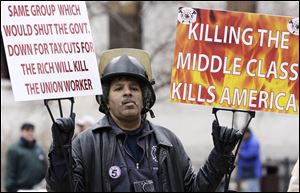
Labor bill advanced by Ohio House committee
Party-line vote sets stage for decision by full chamber
3/30/2011
Larry Cerne of Cleveland, one of the protesters out side the Statehouse during the House committee vote, shows his opinion about the bill.
associated press

Walter Hudson, a union firefighter assigned to Toledo Fire Station No. 14 on Reynolds Road, expresses his displeasure with Senate Bill 5 outside the Ohio Statehouse.
The move sets the stage for a vote Wednesday on Senate Bill 5 by the full House, where Republicans outnumber Democrats 59-40.
The House Commerce and Labor Committee made a number of changes to the bill, among them a provision that could give voters a chance to weigh in on worker contracts. But it was clear the changes had not won over new fans for the bill.
"People's rights were trampled here today," said Rep. Matt Szollosi (D., Oregon), a committee member. " … It was politically motivated, and they don't even try to defend some of the amendments that were achieved today."
The bill passed the committee by a vote of 9-6 with all Republicans supporting it, including northwest Ohio's Rep. Lynn Wachtmann (R., Napoleon). All Democrats opposed it, including Mr. Szollosi and Rep. Dennis Murray (D., Sandusky).
Gov. John Kasich's $55.5 billion, two-year spending plan for the state counts on savings from relaxed union rights at the state and local levels.
Local governments and school districts face deep cuts in the wake of the state's $8 billion budget gap.
BILL'S HIGHLIGHTS
- Prohibits strikes by all public employees.
- Limits negotiations to wages, hours, terms and conditions of employment, and, in some cases, safety equipment.
- Takes issues such as health care, outsourcing, and staffing levels off the negotiations table.
- Permits governments to impose a single health policy for all employees.
- Requires employees to pay at least 15 percent of health-insurance premiums.
- Prohibits the use of seniority as the sole basis for determining layoffs.
- Eliminates final binding arbitration through a third party as the means to end contract disputes involving police, firefighters, and other public safety employees.
- Creates new dispute resolution process for all public employees that involves mediation, fact-finding, and then a public hearing with the final contract being decided by the legislative body of the local government.
- Eliminates automatic longevity increases for teachers and substitutes a merit pay system that would be partly defined by the State Board of Education for teachers and the state Department of Administrative Services for other employees.
- Prohibits collective bargaining by higher-ranking police and firefighters and university professors who are deemed "supervisors."
Those decreases in funding aren't lost on lawmakers, said state Rep. Joseph Uecker, chairman of the House Commerce and Labor Committee.
"We have to give them something in order to help control their costs," said Mr. Uecker (R., Loveland). "I think this bill goes a long way in helping them control the costs."
Senate Bill 5 still would prohibit Ohio's roughly 350,000 public employees from striking, take health-care benefits off the negotiating table, require all employees to pay at least 15 percent of health-care premiums, and eliminate seniority as the sole factor in determining the order of layoffs.
The bill still gives local governments a vote on the final contract after holding a public hearing, but the committee voted Tuesdya to allow for a voter referendum if the local government picks the more expensive of the two final best offers before it and its chief financial officer determines additional revenues would be needed to pay for it.
"It will allow the people to have a say with the parties," said Mr. Uecker. "There's still a local government vote, yes, but there are some triggers there if the people disagree. Any side can gather the signatures required for a referendum of that decision. I think that's very big in our democracy."
The committee amended the bill to crack down on the power of unions to require those who are members of a bargaining unit, but who are not union members, to pay "fair-share fees" to help cover the union's administrative costs.
"I don't like the fact you can decide not to join the union, but still have to pay the dues," said Republican Ron Young of the Mentor area in northeast Ohio, who proposed the change. "It seems to me that in a free country, people should not have to opt out of an organization. If they opt out, they shouldn't have to pay some sort of a penalty for doing so."
Outside the hearing room, Mr. Szollosi said the language is designed to encourage union members to leave the union while still enjoying the raises and other protections that it negotiated.
"They're saying that, for those 10 of you at the bus stop, nine of you have to pay your bus fare to get where you want to go, but the 10th guy says, 'Well, you're going there anyway, so how about I go for free?' " he said.
The Republican-controlled Senate voted 17-16 for the bill this month, and the amended version must return to that chamber for approval of changes made in the House.

Larry Cerne of Cleveland, one of the protesters out side the Statehouse during the House committee vote, shows his opinion about the bill.
Opponents plan to circulate petitions to gather the roughly 231,000 valid signatures of registered voters needed to put the bill on the Nov. 8 ballot.
Some of the changes approved Tuesday are aimed at softening some Senate Bill 5's effect on police, firefighters, and other public safety employees.
It would allow them, as well as some nurses and teachers who deal with potentially dangerous students, to negotiate over safety equipment in addition to wages, hours, and terms and conditions of employment.
However, decisions about staffing levels on firefighting crews and in squad cars would remain under management discretion.
"Staff levels in Toledo are outrageous," said Dan Wagner, president of the Toledo Police Patrolman's Association, who attended Tuesday 's hearing. "We're at an all-time low. With Senate Bill 5, I've been talking to my members who are very close to retirement and have the requirements to retire, trying to tell them to stay on to November to see what happens with the referendum."
The bill eliminates final best-offer binding arbitration, the method currently used to resolve contract disputes involving public safety employees. It replaces it with a process involving mediation, fact-finding, and a public hearing leading up to a vote of the city council, school board, or other government legislative body. The local government's vote also potentially could trigger a voter referendum.
Among other changes, the amendment would:
- Remove a provision that explicitly threatened jail time and fines for public employees who strike illegally. Such employees, however, could face similar sanctions if found in contempt of court for ignoring an order to return to work.
- Prohibit a contract from including a provision automatically deducting money from paychecks to fund a union's political action committee that supports candidates or political issues.
- Authorize the state Department of Administrative Services to develop a merit pay system for most public employees as an alternative to automatic longevity and step pay increases. The State Board of Education would help school boards develop a system for teachers.
- Prohibit local governments from considering the number of traffic tickets written by a police office or highway patrolman when judging them for merit raises.
- Lower to 30 percent from the current 50.1 percent the threshold needed for members of a bargaining unit to petition the State Employment Relations Board to decertify a union and allow employers to initiate that process.
Democratic members of the committee, as well as several minority leaders, walked into Tuesday's hearing bearing boxes they said contained a total of 65,414 signatures of opponents to Senate Bill 5 gathered via the Internet.
They placed the boxes front and center on the committee table, where they would have been in every camera shot. Mr. Uecker acknowledged them, but then ordered them removed.
Although Tuesday's protests were loud because of their proximity to the hearing room, the crowd was a fraction of the size seen at prior hearings.
Protesters are expected back Wednesday for the full House vote, with the bill's opponents acknowledging that the rallies are now less about influencing lawmakers and more about swaying public opinion for the Nov. 8 referendum vote.
Perry Lefever, president of the Sylvania Education Association and an advanced-placement government teacher, attended the rally along with several other Sylvania teachers. He questioned how the State Board of Education and the local school board could come up with a workable merit pay system that eliminates automatic pay increases tied to longevity and education.
"Merit pay is still value-added, and I don't know how to quantify that in all teachers in all circumstances," he said. "We're still trying to figure out how that would relate to my friend here who is a special education teacher. We've never seen a merit-pay system really that works."
Information from the Associated Press was used in this report.
Contact Jim Provance at: jprovance@theblade.com, or 614-221-0496.